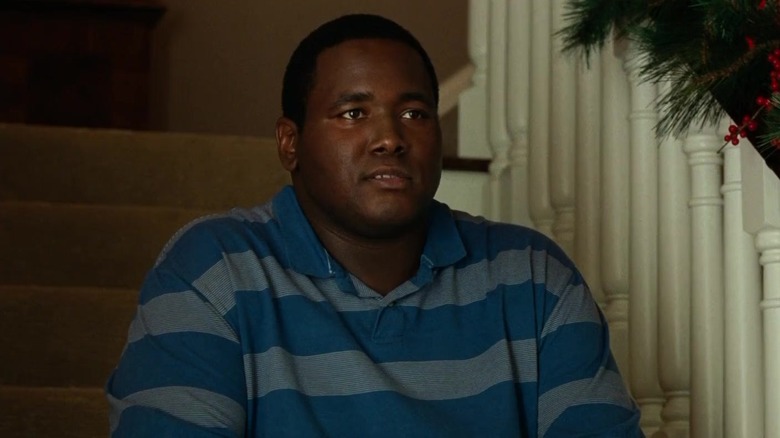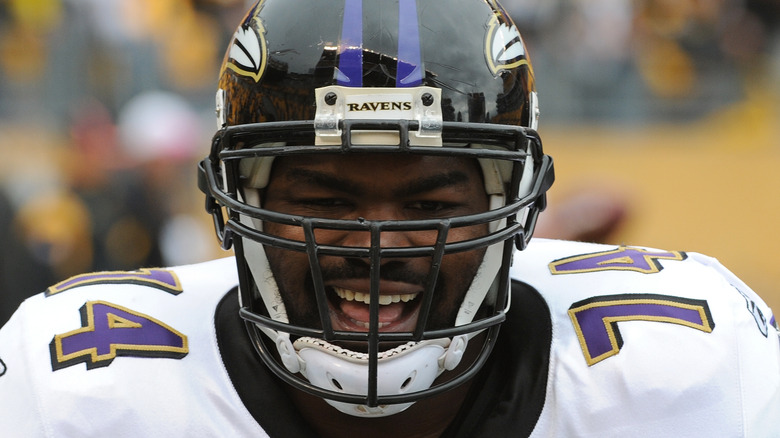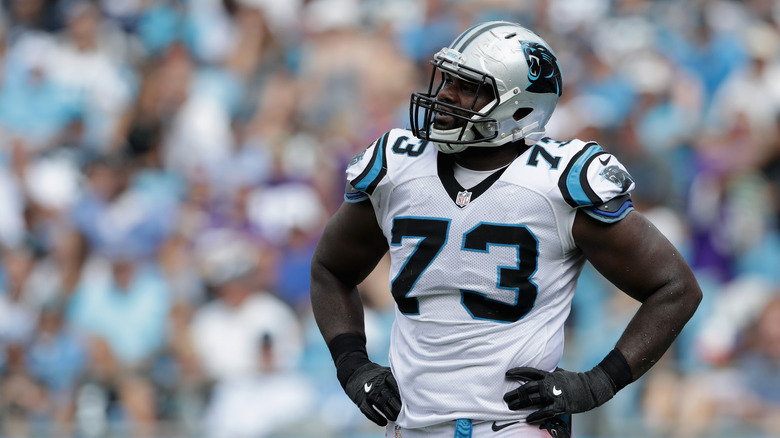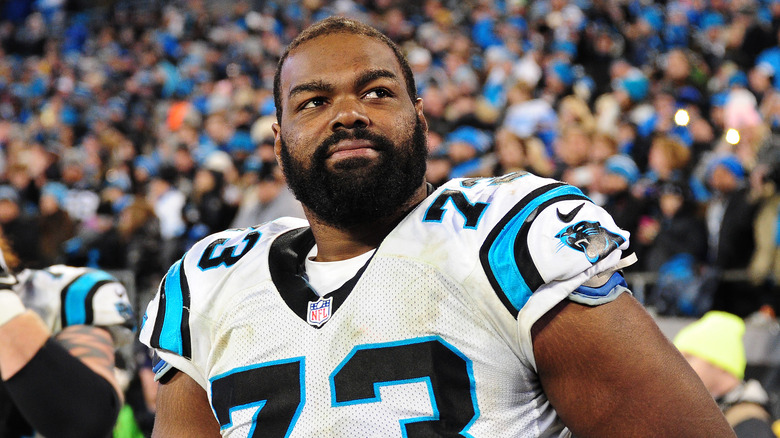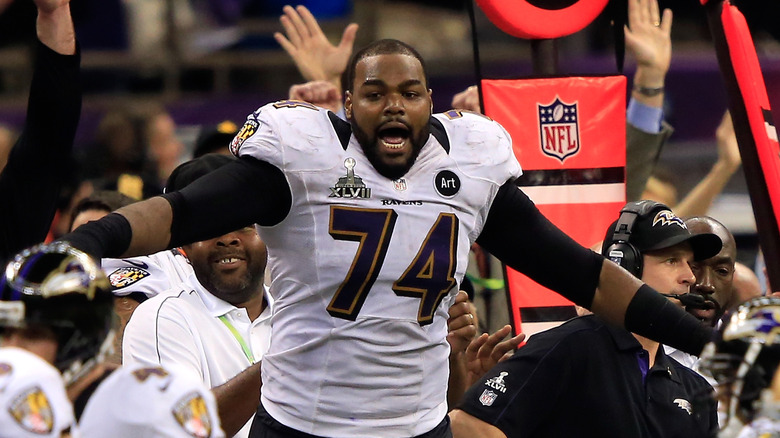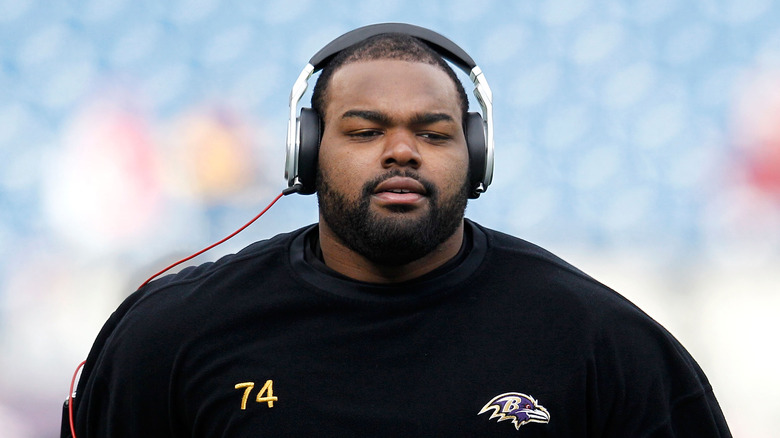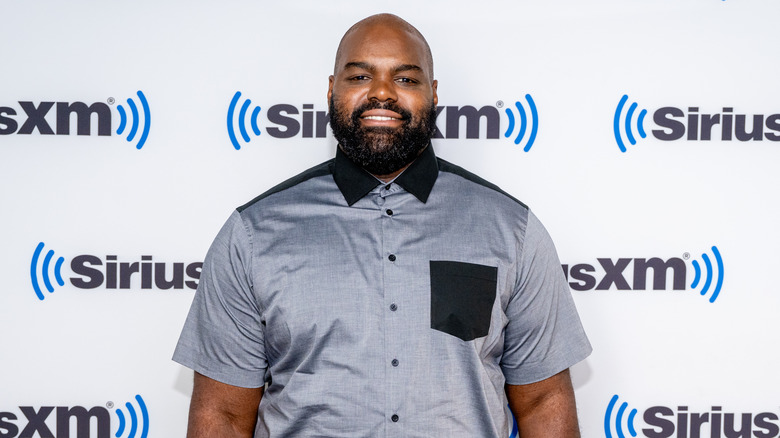Where Is Michael Oher From The Blind Side Now?
"The Blind Side" is easily one of the most inspirational sports dramas to come out of Hollywood in the past 20 years. Released in 2009, "The Blind Side" recounts the story of how a determined Tennessee mother named Leigh Anne Tuohy (Sandra Bullock) took in a homeless 17-year-old, Michael Oher (Quinton Aaron), and helped him aspire to football greatness in high school, college, and the NFL.
Based on Oher's story that was featured in the best-selling book "The Blind Side: Evolution of a Game," the film version of Oher and Tuohy's tale was not only a smash hit with a global box office gross of over $305 million against a $29 million budget; it also earned a best picture Oscar nomination and a best actress Oscar win for Bullock. The beauty of "The Blind Side" is that Oher's story didn't end with the conclusion of the film.
Michael Oher played for eight seasons in the NFL
Oher had the Tuohy family's support as he went on to play college football for The University of Mississippi (aka Ole Miss), which was the alma mater of both Leigh Anne and Sean Tuohy (played by Tim McGraw in the film). After earning several honors in college, Oher was taken as the 23rd pick in the first round of the 2009 NFL draft by the Baltimore Ravens. After signing a five-year, $13.8 million contract with the team, Oher played left and right offensive tackle in his first year for the Ravens. His play on the field was so impressive, in fact, that he came in second place in voting for The Associated Press' Offense Rookie of the Year.
Oher started in every game with the Ravens for the five seasons he was with the team, with one of his career highlights coming on February 3, 2013, when he earned a Super Bowl ring after the Ravens beat the San Francisco 49ers 34-31 in Super Bowl XLVII.
Michael Oher retired from the NFL in 2017
After his five-year run with the Ravens, Oher signed a four-year, $20 million contract with the Tennessee Titans. His tenure with the team was short-lived, though, since he was put on the injured reserve list with a toe injury after starting 11 games. While the Titans released Oher after the season, the tackle proved that he wasn't ready to hang up his cleats, and signed a two-year, $7 million contract with the Carolina Panthers.
Oher played in 16 games for the Panthers during the 2015 season and made his second bid for an NFL championship when the team played in Super Bowl 50 against the Denver Broncos in February 2016. The Panthers came up short, however, losing to the Broncos 24-10. Sadly, Oher only made three starts for the Panthers in the 2016 season before being put on the injured reserve list for concussion-like symptoms — a move that effectively ended his career.
While Oher retired from football after failing a physical in 2017, the story of the true-life inspiration behind "The Blind Side" has a happy ending. According to the Ravens news blog Russell Street Report, Oher purchased a home in Nashville in 2017 and has a reported worth of almost $20 million. Meanwhile, Quinton Aaron, who brought Oher to life on the big screen, has worked nonstop since "The Blind Side" and has amassed more than 50 acting credits.
He's dedicated himself to improving his mental health
Everyone who makes it to the NFL is by definition exceptional, but Michael Oher's journey to the big league was more difficult than most. Oher had to overcome a lot of adversity to accomplish everything he did, and by the time his playing career ended, he found that he was still struggling with his mental health — particularly the unresolved issues related to his upbringing.
Oher described his mental health journey to People Magazine: "I'm still traumatized and I still deal with things that I dealt with as a kid," Oher said. "If you're still dealing with trauma, [therapy] is definitely needed early on, because I had to do that to get back healthy."
Oher also said that delaying getting the help he needed made his mental health issues more difficult. "The mind is the most powerful thing and it has to be healthy to be successful," explained Oher. "I bottled so much stuff up throughout my life. I carried that with me and I think it hurt me in the long run. That may be the only thing holding you back from being where you want to be — talking to somebody."
If you or someone you know needs help with mental health, please contact the Crisis Text Line by texting HOME to 741741, call the National Alliance on Mental Illness helpline at 1-800-950-NAMI (6264), or visit the National Institute of Mental Health website.
He launched a community-based charity app called Good Deeds
For Oher, one of the difficulties of growing up homeless was not having the basic necessities like food and clothing that many people take for granted. This also took a toll on his mental health. Once his daily needs were covered, it made a difference.
"When I started to see that I had two or three pair of shoes to wear to school and I had multiple pants, my mental health started getting stronger," Oher told People Magazine. "I could focus on school, and my grades started to go up. I was eating, so I could focus on other things rather than being hungry, that's when I really started to excel. I started to create that path because I didn't have the small things to worry about and it all came from help. It all came from help from other people and other resources and without that, I wouldn't be here."
Now that his playing days are over, Oher has sought to help people get their daily needs met via his app, Good Deeds. The app lets neighbors connect and give each other necessities like shoes, clothing, baby formula, school supplies, and more. Users can create a profile and state what they need, or what they can give. The app then connects them with people within a 100-mile radius.
He's active with his foundation, Beat the Odds, Inc.
When he's not running his app, Michael Oher spends time with his nonprofit organization, Beat the Odds, Inc. The Nashville-based charity provides disadvantaged youths with opportunities to improve their lives, higher education, health, and careers. The organization regularly hosts free football camps in Nashville, which also include parenting workshops, tutoring workshops, and community service projects. Other workshops offer training in life skills, education, and mentorship. Beat the Odds has also held back-to-school clothing and supply drives.
Oher views giving back not just as a good deed, but a duty. "There are so many other people out there like me, so I have an obligation to continue to show them the way in," he told People Magazine. "People are struggling and it's my job to let them know that, 'Hey, I know the road so we can get there together.' So that's the thing that keeps me going every day."
Discoveries in 2023 led Oher to question his adoptive parents' intentions
Once Oher retired from football in 2016, he started to dig more into his adoptive family. He was curious about some of the paperwork that had been brought to his attention, why he was portrayed in "The Blind Side" as unintelligent, and how he had never seen any money from a blockbuster movie based on his life. What he found out has thrown into question everything in the story, and brought Oher at odds with the Tuohy family.
ESPN writes that, in 2023, Oher petitioned a Tennessee court claiming that the Tuohy family never legally adopted him. Instead, he claims the family tricked him into signing forms that made them his conservators just before he turned 18. On top of that, Oher's court petition makes claims that the Tuohy family made significant money off "The Blind Side" film: it claims each family member was paid "$225,000, plus 2.5% of the film's 'defined net proceeds.'" Finally, the filing claims that Oher gave away the rights to his life story to 20th Century Fox for no money at all — a contract he believes he never signed.
Although nothing has been proven as of this writing, Oher continues to make strong arguments that the Tuohy family actually took advantage of him, rather than taking him in out of the kindness of their hearts — an ugly outcome for what was once a heartwarming story.
